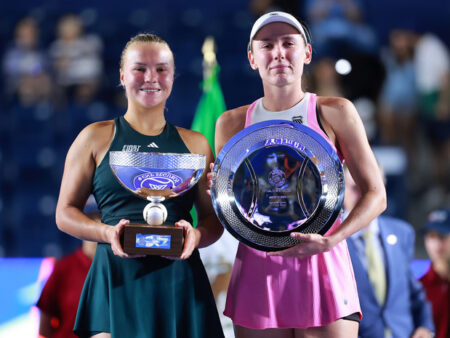In the intricate world of professional boxing, few aspirations burn brighter for a champion than the quest to unify titles and be crowned undisputed. Yet, this noble ambition often clashes with a harsh reality: getting the best fighters to face each other, especially across different sanctioning bodies, frequently proves to be an exercise in futility. The frustration recently voiced by WBC Super-Featherweight champion O’Shaquie Foster offers a stark, yet all too familiar, glimpse into this ongoing struggle.
O`Shaquie Foster`s Unification Lament
O’Shaquie Foster, a fighter of considerable skill and a reigning champion at 130 lbs, finds himself in a peculiar predicament. Despite holding one of boxing`s coveted green belts, his attempts to consolidate power in the super-featherweight division have been met with a wall of rejections. Foster openly blames his fellow champions—Emanuel Navarrete (WBO), Lamont Roach Jr (WBA), and Eduardo Nunez (IBF)—for their reluctance to step into the ring for unification bouts.
According to Foster, negotiations have repeatedly stalled, leaving him feeling shunned. He recounts efforts to fight Roach, Navarrete, and even Nunez before he claimed his IBF strap, all culminating in dead ends. “These guys have had so many chances to unify with me,” Foster stated, lamenting that “none of them want to.” It`s a testament to the bewildering nature of boxing politics when a champion, eager to prove himself the definitive best, can`t find willing dance partners among his peers.
The situation with Navarrete is particularly ironic. Both fighters are under the same promotional umbrella, Top Rank. One might assume this shared promoter would facilitate such a high-stakes encounter, yet Foster claims his inquiries have been met with a firm “no.” This internal promotional friction only underscores the Byzantine complexities that often prevent the most logical and exciting matchups from materializing. When even a common promoter can`t bridge the gap, what hope is there for cross-promotional mega-fights?
This persistent frustration has forced Foster to seek opportunities elsewhere. His upcoming clash with WBC featherweight champion Stephen Fulton, while an intriguing contest, clearly represents a secondary option – a detour rather than the desired path to undisputed glory. It`s a pragmatic move for a fighter who needs to stay active, but it leaves fans, and likely Foster himself, wondering about the unfulfilled promise of a truly unified division.
The Unification Paradox: More Than Just Reluctance
Foster`s experience is not an isolated incident; it`s a recurring theme that plagues modern boxing. The “unification paradox” sees champions, supposedly at the peak of their powers, seemingly more inclined to defend against mandatory challengers or pursue “money fights” outside their division rather than face a fellow belt-holder. Why does this happen?
Promotional and Network Barriers
- Conflicting Interests: Different promoters have different stables, different networks, and different financial incentives. A promoter might prefer to keep two champions apart to maximize their individual value, rather than risk one losing in a unification bout.
- Contractual Obligations: Exclusive deals with broadcasters (e.g., ESPN, Showtime, DAZN) can make cross-platform fights logistically and financially challenging, if not impossible, without significant concessions.
The Fighter`s Perspective: Risk vs. Reward
- Protecting the Record: An undefeated record, or one with minimal losses, is a valuable asset. A unification fight is inherently high-risk, as it pits two of the best against each other. For some, the potential reward of an extra belt might not outweigh the risk of a career-damaging loss.
- Financial Incentives: Sometimes, a non-unification fight against a popular contender or a move up/down in weight for a perceived “super fight” offers a greater payday with less perceived risk than a unification match against an equally skilled, lesser-known champion. Foster`s observation about Roach potentially “not going to get paid enough” for a unification highlights this cold reality.
- “Scared” or Strategic? Foster directly accused Cacace of being “scared” of Nunez, and Nunez of being “scared” of him. While fighters rarely admit fear, a strategic avoidance of a particularly difficult matchup for a similar or better financial outcome is a valid, if cynical, business decision in a brutal sport.
The Belt Overload Dilemma
With four major sanctioning bodies (WBC, WBA, IBF, WBO) each crowning their own “world champions,” the very concept of a single, definitive ruler becomes diluted. While unifications theoretically bring clarity, the sheer number of belts often makes the path to undisputed status a bureaucratic nightmare, ripe for delays and disputes.
The Impact on Fans and the Sport
The ultimate casualty of this unification gridlock is the boxing fan. The yearning for undisputed champions, for clear lineal kings, often goes unfulfilled, leaving behind a trail of “what if” scenarios. It dilutes the legacy of champions and makes it harder for casual fans to follow who the true king of a division is. Foster`s frustration resonates with anyone who has watched two top fighters in the same weight class dance around each other for years, only to eventually move on without ever settling the score.
While boxing provides unparalleled drama and athleticism, its internal politics can often be its greatest opponent. The dream of a single champion, holding all the gold, remains boxing’s purest ideal, one that O`Shaquie Foster, and countless others, continue to chase, often against the seemingly insurmountable odds of the sport`s own ecosystem.
In the end, Foster`s pivot to face Fulton is a pragmatic compromise in a sport that frequently prioritizes business over straightforward sporting contests. It`s a reminder that while the boxing ring is a place of raw courage and skill, the boardroom battles and promotional chess games often dictate who fights whom, and perhaps more importantly, who doesn`t.










